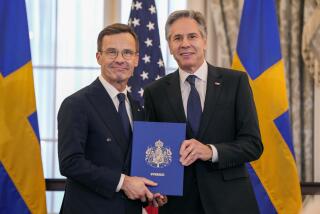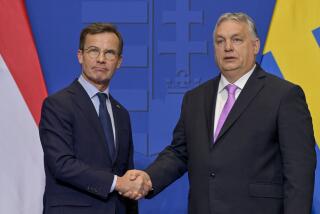Swedish Leader’s Visit Ends 26-Year Chill
- Share via
WASHINGTON — President Reagan and Swedish Prime Minister Ingvar Carlsson ended a 26-year period of chilly U.S.-Swedish relations Wednesday with a White House meeting at which the two differed “without fireworks” on Central America and the proposed Strategic Defense Initiative, a senior American official said.
Carlsson’s visit, the first by a Swedish prime minister since the John F. Kennedy Administration, signaled the end of a diplomatic freeze dating to the Vietnam era, when former Prime Minister Olof Palme bitterly denounced U.S. policy in Southeast Asia.
The senior U.S. official, who spoke on condition of anonymity, said that Wednesday’s 50-minute session put the “finishing touches” on a long-running effort by the two nations to repair the frayed relations.
“This was not a tough-talking meeting,” the official said.
Reagan, Carlsson and teams of advisers were said to have conducted only a general review of the two nations’ foreign policies and avoided direct criticism of their opposing views on U.S. policy in Central America and other matters.
The senior official said that the President defended U.S. policy toward Nicaragua, where American-backed contras have received $100 million in the last year to press a guerrilla war against that country’s leftist Sandinista government.
Sweden will give almost $30 million in aid this year to the Sandinista regime and has argued that an end to outside interference in Nicaragua would speed a transition to democratic rule there.
Instead of differing, however, Carlsson “thanked the President for his exposition, noted that Sweden had another point of view” and discussed the prospects for success of a regional peace proposal agreed to last month by five Central American nations.
Carlsson also told Reagan that Sweden is “skeptical” of the U.S. Strategic Defense Initiative, also known as the “Star Wars” program, which seeks to build a space-based defense against nuclear missiles. The Swedish leader conveyed fears that the program may spur a new nuclear weapons race.
But he publicly praised American and Soviet efforts to reach an agreement to eliminate medium-range nuclear missiles, saying that such a treaty “will be hailed as a first step toward the ultimate goal of a world without nuclear weapons.”
“Where there were areas of disagreement, they were recorded, but there was no effort to resolve them,” the official said of the Reagan-Carlsson discussion.
The two men also discussed the Iran-Iraq conflict, U.S. efforts to promote free trade and the political situation in South Africa and its border-state neighbors.
The meeting was the highest-level contact between the United States and Sweden since 1961, when former Prime Minister Tage Erlander met with Kennedy.
In a welcoming ceremony at the White House, Reagan suggested that the two nations ask the Kremlin to disclose the fate of Raoul Wallenberg, the Swedish diplomat who vanished inside the Soviet Union after helping free hundreds of thousands of Hungarian Jews from Nazi domination during World War II. The official Kremlin position is that Wallenberg died of natural causes in the Soviet Union in 1947.
Reagan, noting that the United States had made Wallenberg an honorary citizen, called him “a hero of moral and humane people the world over.” The President’s proposal for a joint appeal was not pursued in the private meeting between the two leaders, the senior official said.
Carlsson also asked for America’s help in freeing three Swedish development workers who were reportedly kidnaped Wednesday by U.S.-backed rebels fighting inside Angola. Reagan “took the request and . . . will get back through official channels,” the senior official said.
Reagan and his wife, Nancy, hosted a state dinner for Carlsson at the White House in the evening.
More to Read
Sign up for Essential California
The most important California stories and recommendations in your inbox every morning.
You may occasionally receive promotional content from the Los Angeles Times.













